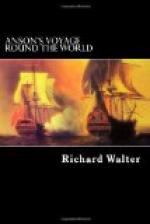with so much violence that it was impossible for a
boat to land; that at the end of their run they could
just discover two paps at a very great distance to
the eastward, which from their appearance and their
latitude they concluded to be those in the neighbourhood
of Acapulco, but that, not having a sufficient quantity
of fresh water and provision for their passage thither
and back again, they were obliged to return to the
Commodore to acquaint him with their disappointment.
On this intelligence we all made sail to the eastward,
in order to get into the neighbourhood of that port,
the Commodore resolving to send the barge a second
time upon the same enterprise when we were arrived
within a moderate distance. And the next day,
which was the 12th of February, we being by that time
considerably advanced, the barge was again despatched,
and particular instructions given to the officers to
preserve themselves from being seen from the shore.
On the 19th of February she returned, and we found
that we were indeed disappointed in our expectation
of intercepting the galleon before her arrival at
Acapulco; but we learned other circumstances which
still revived our hopes, and which, we then conceived,
would more than balance the opportunity we had already
lost. For though our negro prisoners* informed
us that the galleon arrived at Acapulco on our 9th
of January, which was about twenty days before we
fell in with this coast, yet they at the same time
told us that the galleon had delivered her cargo and
was taking in water and provisions for her return,
and that the Viceroy of Mexico had by proclamation
fixed her departure from Acapulco to the 14th of March,
New Style.
(Note. Three negroes in a fishing canoe had
been captured by the Centurion’s barge off Acapulco
harbour.)
This last news was most joyfully received by us, as
we had no doubt but she must certainly fall into our
hands, and as it was much more eligible to seize her
on her return than it would have been to have taken
her before her arrival, as the specie for which she
had sold her cargo, and which she would now have on
board, would be prodigiously more to be esteemed by
us than the cargo itself, great part of which would
have perished on our hands, and no part of it could
have been disposed of by us at so advantageous a mart
as Acapulco.
Thus we were a second time engaged in an eager expectation
of meeting with this Manila ship, which, by the fame
of its wealth, we had been taught to consider as the
most desirable prize that was to be met with in any
part of the globe.
(Note. The capital of Luzon, the chief island
of the Philippine group. The Philippines were
discovered in 1521 by Magellan, who was killed there
by the natives. They were annexed by Spain in
1571 and were ceded to the United States of America
in 1898, together with Cuba, after the brave but futile
attempt of the Spaniards to preserve what were almost
the last relics of their colonial dominions.)




